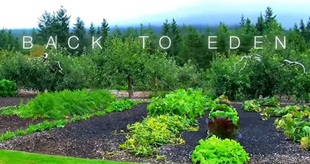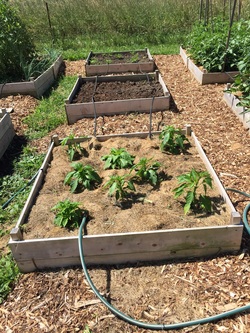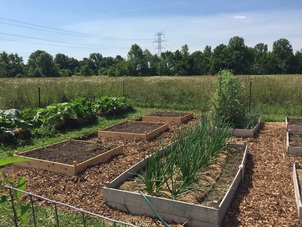
In short, the concept is that God (or nature) grows plants perfectly and with no effort, and we have made gardening difficult by trying to change things and go against the way that nature works.
This appeals to me in a number of ways. Being a believer as well as a very curious person, I am always interested in learning more about how God works in the world all around us, and why things are the way they are. And of course, reducing the work it takes to maintain our large garden is always a welcome blessing! So I watched the movie and found it very interesting and inspiring.
We haven't truly implemented this system in our garden just yet, but I think we are starting to move in that direction. Here's what I learned from the movie, and what we have done with the information so far...
The film promotes the use of wood chips for this purpose, although he admits that other organic materials (hay, straw, leaves, grass clippings, etc.) can also be used. I have relied heavily on grass clippings in years past, and still continue to do so, although we did have some problems with them this year - particularly in our bean beds. (Apparently, voles love to hide under the soft, fluffy layers of grass, and they were devouring our beans and bean plants alike. Removing all of the mulch from the beds seemed to fix the problem - so I will note this for next year.) Since we have a large supply of clean, chemical-free grass clippings from our large lawn, they are easy to come by, and they also decompose nicely, enriching the soil quickly. I cover all my garden beds with a thick layer of clippings for the winter, and when it's time for spring planting, they have all but melted away into the soil, but they still help prevent early spring weeds from taking hold before I can plant crops.
The use of wood chips is somewhat controversial among gardeners, but from what I can tell, those who have had problems with wood chips have used them incorrectly. As the film explains, you should never till or otherwise mix wood chips into your soil, as they will pull nitrogen from the soil as they decompose, and deplete your soil of nutrients. However, if you pile wood chips ON TOP of the soil, as the film recommends, they will decompose more slowly, and the bottom layers will gradually become incorporated into the soil and add nutrients as they turn into compost over time.
Our first foray into wood chips started this year, but we aren't exactly using them in quite the way the film explains...
 Here you can see the difference between
Here you can see the difference between mulched (right) and un-mulched (left)
garden aisles.
After some asking around, my husband was able to find a local source of free wood chips, and over several weeks, we piled them in between all of the garden beds.
Although in many ways, this has been a very challenging summer garden-wise, in terms of weeds, it was the easiest one yet!
Last year, my husband mowed the garden paths every couple of weeks, and I spent hours and hours weeding around the edges of the beds where the mower couldn't reach, and between them where the drip irrigation lines ran. Even with all of our efforts, the pathways still always looked rather messy, and the weeding was never-ending.
This summer, all that was changed after the addition of the wood chips...
I now weed the garden paths for approximately 15-20 minutes once every 4-6 weeks. That's it! My husband now only has to mow around the perimeter of the garden, which only takes him a few minutes, and is much easier than trying to maneuver the mower between all the garden beds.
Our first summer here was a very rainy summer, and our heavy clay soil isn't the best at draining, which meant that our garden turned into a swamp every time it rained. Brackish water stood in the garden aisles for days at a time, attracting mosquitoes, as well as making it difficult to work in the garden.
An added benefit of the wood chips is - no standing water! This summer was nearly as rainy as the first, but I never once had to slosh through muddy water to tend the garden after a rain. Instead, I worked on a soft, thick and absorbent carpet of damp wood chips - no mosquito swamps in sight!
 The finished project.
The finished project. I am not sure about putting wood chips in the actual garden beds - I worry they would inadvertently get mixed into the soil when planting, etc. But I might try it on a small area and see what happens. I think we will definitely use them when we plant trees, though. I am hopeful that this may help with the drainage issue (last time we planted fruit trees they all drowned), as well as keeping the grass down around the trees, which was also a problem with our first set of fruit trees.
With raised beds, our garden setup is quite a bit different than the Back to Eden garden, but the basic concept makes so much sense, and it truly could be the answer to many of the soil problems we are facing today as a nation.
Besides the mulch concept, the movie is also just fun to watch - it's so awesome to see all the beautiful vegetables and think about how they grew in just the way God intended! I loved the focus on the garden as an integrated holistic system, as well as the emphasis on man "tending the garden" and actually taking care of the planet God gave us to live on - something that I find oddly lacking in most Christian discussions...
You can check out the Back to Eden film here - it is truly an inspiring watch!
Rose.



 RSS Feed
RSS Feed